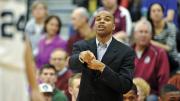Five seasons ago, Harvard had never won an Ivy basketball championship. Now it has captured four in a row and to all appearances is becoming a national hoops power. Returning to the NCAA tournament after their first win at the “dance” last spring, the twelfth-seeded Crimson upset fifth-seeded Cincinnati, 61-57, in their initial game. Next they faced Michigan State, a heavy favorite ranked first in the country early in the year and picked by many to win the whole tournament. But Harvard astounded the basketball-savvy crowd in Spokane with a stunning 29-11 run in the second half. Facing a daunting 16-point deficit early in the stanza, the Crimson took a 62-60 lead with 7:12 to play, bringing the arena to a frenzy. Ultimately, the Spartans found enough counters in the closing minutes to pull out a 80-73 victory. (More details are available at https://harvardmagazine.com/2014/03/harvard-basketball-michigan-state-ncaa-2014.)
“I can’t say enough about our team and the effort and the guts that they showed in the second half to make a run, to take the lead, to play with so much composure and fight,” Harvard coach Tommy Amaker declared in a New York Times report. “I was so proud to see that happen.” Clark Kellogg, the lead college basketball analyst for CBS, which aired the game, said, “I am really impressed with the Crimson. Harvard played with the kind of tenacity you may not expect from an Ivy League team.” And one veteran observer of Crimson athletics, former Sports Illustrated editor Dick Friedman ’73, declared it “the best loss in Harvard sports history. Sometimes defeat makes you prouder than many victories. Tonight was one of those nights.”
Amaker, who has spearheaded the spectacular turnaround in Crimson basketball fortunes, was in the news for another reason as the tournament unfolded. The firing of Boston College’s head coach instantly triggered media speculation that Amaker would leave Harvard after his seven seasons at the helm to take over the floundering program across town—no doubt with a drastically enlarged salary and the big-time challenge of Atlantic Coast Conference competition. Instead, Amaker surprised many by electing to stay with the Crimson. “After thoughtful deliberation, I continue to realize my heart is at Harvard,” he declared. “To teach, lead, and serve at this amazing institution, and in this special community, is truly meaningful to me.”









